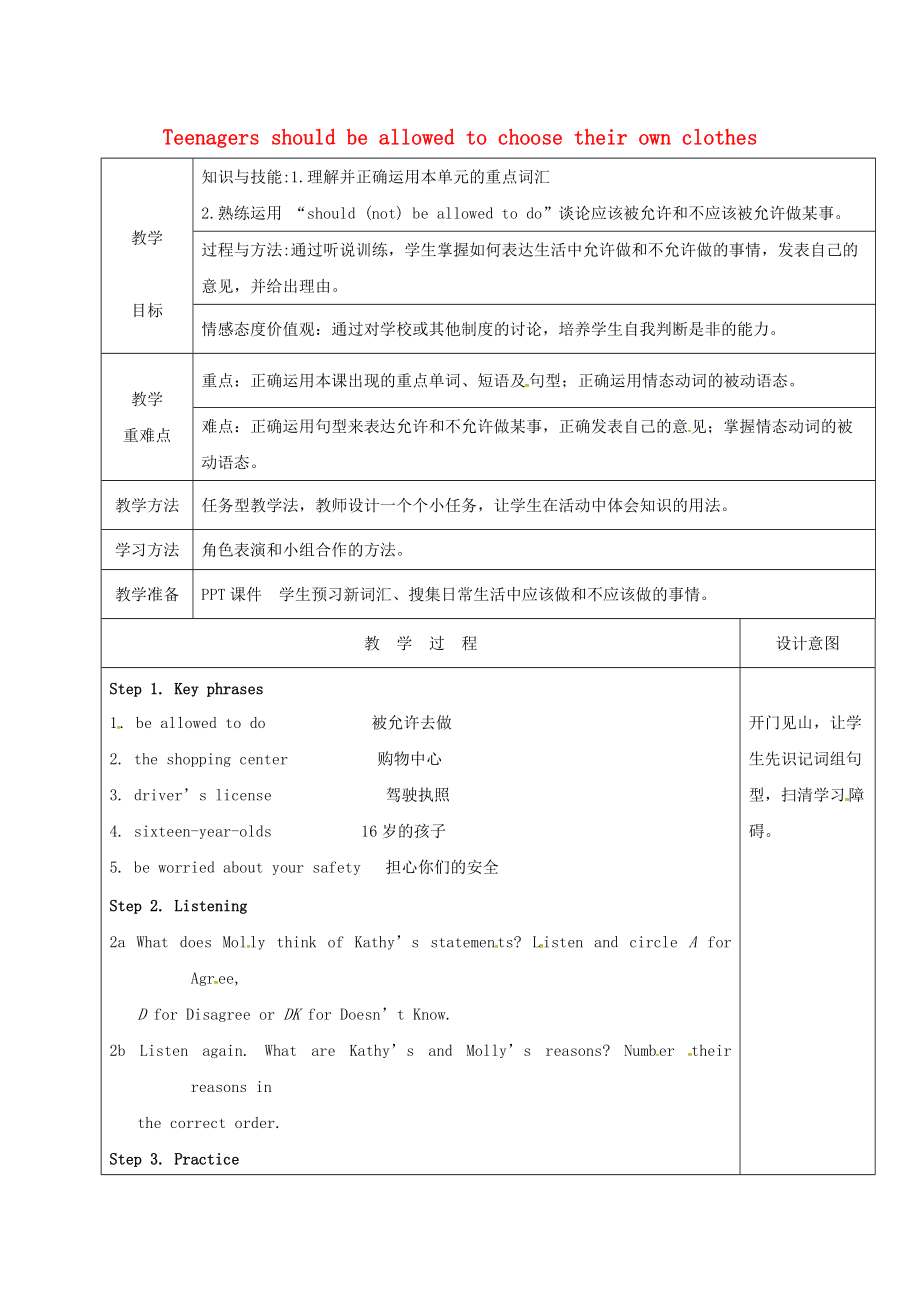《九年級(jí)英語(yǔ)全冊(cè) Unit 7 Teenagers should be allowed to choose their own clothes第2課時(shí)教案 新版人教新目標(biāo)版》由會(huì)員分享,可在線閱讀���,更多相關(guān)《九年級(jí)英語(yǔ)全冊(cè) Unit 7 Teenagers should be allowed to choose their own clothes第2課時(shí)教案 新版人教新目標(biāo)版(3頁(yè)珍藏版)》請(qǐng)?jiān)谘b配圖網(wǎng)上搜索��。
1�、
Teenagers should be allowed to choose their own clothes
教學(xué)
目標(biāo)
知識(shí)與技能:1.理解并正確運(yùn)用本單元的重點(diǎn)詞匯
2.熟練運(yùn)用 “should (not) be allowed to do”談?wù)搼?yīng)該被允許和不應(yīng)該被允許做某事。
過程與方法:通過聽說訓(xùn)練����,學(xué)生掌握如何表達(dá)生活中允許做和不允許做的事情,發(fā)表自己的意見��,并給出理由�。
情感態(tài)度價(jià)值觀:通過對(duì)學(xué)校或其他制度的討論�����,培養(yǎng)學(xué)生自我判斷是非的能力���。
教學(xué)
重難點(diǎn)
重點(diǎn):正確運(yùn)用本課出現(xiàn)的重點(diǎn)單詞����、短語(yǔ)及句型�;正確運(yùn)用情態(tài)動(dòng)詞的被動(dòng)語(yǔ)態(tài)。
難點(diǎn):正確運(yùn)用
2���、句型來表達(dá)允許和不允許做某事����,正確發(fā)表自己的意見;掌握情態(tài)動(dòng)詞的被動(dòng)語(yǔ)態(tài)��。
教學(xué)方法
任務(wù)型教學(xué)法��,教師設(shè)計(jì)一個(gè)個(gè)小任務(wù)���,讓學(xué)生在活動(dòng)中體會(huì)知識(shí)的用法�。
學(xué)習(xí)方法
角色表演和小組合作的方法��。
教學(xué)準(zhǔn)備
PPT課件 學(xué)生預(yù)習(xí)新詞匯��、搜集日常生活中應(yīng)該做和不應(yīng)該做的事情����。
教 學(xué) 過 程
設(shè)計(jì)意圖
Step 1. Key phrases
1. be allowed to do 被允許去做
2. the shopping center 購(gòu)物中心
3. driver’s license 駕駛執(zhí)照
4
3����、. sixteen-year-olds 16歲的孩子
5. be worried about your safety 擔(dān)心你們的安全
Step 2. Listening
2a What does Molly think of Kathy’s statements? Listen and circle A for Agree,
D for Disagree or DK for Doesn’t Know.
2b Listen again. What are Kathy’s and Molly’s reasons? Number their reasons in
4、
the correct order.
Step 3. Practice
1. 2c Make a list of things teenagers should and should not be allowed to do. Discuss your list with your partner.
A: Do you think teenagers should...?
B: Yes, I .../No, I...
2. 2d Read the conversation and answer the questions.
1) Where do they go for sch
5�、ool trip?
2) Does Mr. Smith allow students to take photos?
3) How to take photos?
3. Role-play the conversation.
Step 4. Explanation
1) sixteen-year-olds十六歲的青少年
它相當(dāng)于一個(gè)名詞,等于sixteen – year- old kids.
“一個(gè)16歲青少年的表達(dá)方式”
2) He doesn’t seem to have many friends.
主+seem to do sth. 好像
6����、e.g. His temperature seems to be all right. 他的體溫好像完全正常����。
(1) seem+形容詞
e.g. The question seems quite easy. 那個(gè)問題好像很容易。
(2) seem+名詞
e.g. That seems a good idea. 那好像是個(gè)好主意���。
(3) It seems + that 從句
IX. Homework
Talk about what should be allowed to do or should not be allowed to do in school
7��、or your family.
開門見山��,讓學(xué)生先識(shí)記詞組句型���,掃清學(xué)習(xí)障礙。
問題導(dǎo)路��,讓學(xué)生以回答問題的方式理解對(duì)話內(nèi)容���。
出示語(yǔ)言知識(shí)點(diǎn)����,學(xué)生識(shí)記背誦并舉例子,當(dāng)堂理解并運(yùn)用所學(xué)知識(shí)����。
板書
設(shè)計(jì)
Unit 7 Teenagers should be allowed to choose their own clothes.
Section A(2a-2d)
part-time jobs get their ears pierced their own clothes
教后
反思
6EDBC3191F2351DD815FF33D4435F3756EDBC3191F2351DD815FF33D4435F3756EDBC3191F2351DD815FF33D4435F3756EDBC3191F2351DD815FF33D4435F3756EDBC3191F2351DD815FF33D4435F3756EDBC3191F2351DD815FF33D4435F375
 九年級(jí)英語(yǔ)全冊(cè) Unit 7 Teenagers should be allowed to choose their own clothes第2課時(shí)教案 新版人教新目標(biāo)版
九年級(jí)英語(yǔ)全冊(cè) Unit 7 Teenagers should be allowed to choose their own clothes第2課時(shí)教案 新版人教新目標(biāo)版

